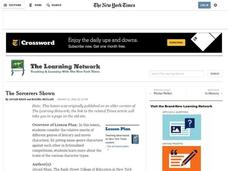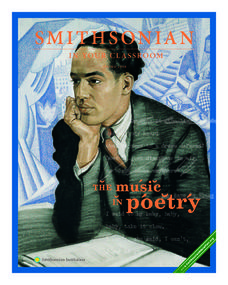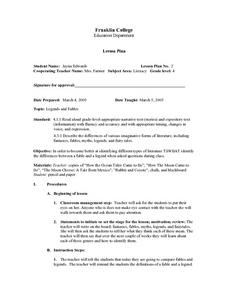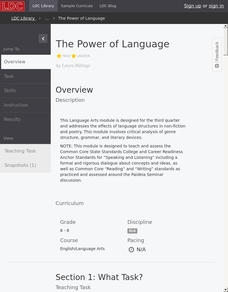Curated OER
The Sorcerers Shown
Students consider the different genres of literary and movie characters. For this character types lesson, students brainstorm character genres from books and movies. Students read the article 'Which Wizard Beats 'Em All?' and develop...
Curated OER
Horror Tales: What Makes Them Spooky?
Before you jump into this lesson, be aware there is little to work with. That being said, the ideas are solid and will be brought to life with a little Halloween spirit. Learners examine horror as a sub-genre, and contemplate what makes...
Film English
Music
Some emotions are indescribable, but sometimes you have to try! After brainstorming adjectives that describe emotions, pupils watch a quick film, at first with no sound. Partners share their adjectives and come up with descriptions for...
Smithsonian Institution
Affirmation, Assimilation, and Acculturation: Middle School
Latin American culture is deeply embedded in American culture as a whole. From the Latin rock scene in San Francisco to the hip-hop world of New York, Latin American artists have influenced every genre of modern music. Learn about the...
Chandler Unified School District
Satire: The Art of Indirect Persuasion
A free press is entitled to its opinions. While the news pages report the facts of events, editorial pages feature writers' and cartoonists' opinions about events to either directly or indirectly persuade. Introduce viewers to the art of...
Curated OER
During Reading Strategy for Charles Dickens’ Great Expectations
Readers create a literary scrapbook for one of the characters in Charles Dickens' Great Expectations and fill it with mementoes, journal entries, letters, etc. A great way to get kids to think about characterization.
Penguin Books
A Teacher’s Guide to the Signet Classics Edition of Mary Shelley ’s Frankenstein
Contrary to popular belief, the monster's name in Mary Shelley's Frankenstein is not Frankenstein. A teacher's guide for the novel helps readers make sense of key details in the text, define vocabulary words, and discuss prominent...
Smithsonian Institution
Smithsonian In Your Classroom: The Music in Poetry
Take poetry off the page and put it into terms of movement, physical space and, finally, music with this series of three lessons from the Smithsonian Institution. This resource introduces students to two poetic forms that originated as...
Novelinks
The Little Prince: Picture Book Strategy
Picture books aren't just for children; they carry strong, valuable messages for adult as well. Explore the audience for Antoine de Saint-Exupéry's The Little Prince with a lesson that compares picture books to literature intended for...
Curated OER
Crane, London, and Literary Naturalism
Students identify the key characteristics that comprise American literary naturalism in Jack London's "To Build a Fire" and Stephen Crane's "The Open Boat." In this naturalism analysis instructional activity, students identify...
Curated OER
Genre Study
Third graders develop an understanding of genre by participating in small- and whole-group activities. In addition, they practice presentation and specific listening skills. This lesson assumes students have been regularly exposed to a...
Curated OER
Using Graphic Organizers to Generate Genre Definitions
Students listen to or read a variety of stories and then work individually or in groups to complete graphic organizers that will help them focus on elements within different types of stories. They write definitions for a variety of story...
Curated OER
Chocolate Chaos
Second graders demonstrate the ability to examine the elements of a story (theme, plot, setting, mood) and characters, by discussing and writing about each. They have fun with chocolate related activities and enjoy reading about some...
Curated OER
Apples, Apples, Apples
Students complete activities using apples that help improve their science, math, and reading skills. In this apple lesson, students read the book Apples, Apples Apples and visit an orchard or farmer's market to buy a variety of apples....
Curated OER
Legends and Fables
Fourth graders identify and discuss the differences between legends and fables. They define fable and legend, then as a class take turns reading our books. Students select two of the stories, and complete a Venn diagram, comparing one...
Curated OER
Language Arts: Stylistic Devices
Students are able to define given literary terms, such as metaphor, simile, imagery, personification, symbolism, etc. They are able to identify the use of literary elements in a given text. Students are able to interpret weather...
Curated OER
Discovering the Deep
Students explore the world's oceans. They research questions about the oceans and write a research report about an ocean animal. Students identify at least four different writing genres they experienced while reading about the ocean.
Curated OER
Library Curriculum: What Would a Wonderful Library Be Like?
Second graders complete a KWL chart about libraries. They create a book using writing patterns of a particular author. Students decide criteria for awarding the Second Grade Librarian Award to books in the classroom library, and use a...
Curated OER
Poetry-The Essence of Life
Students analyze and appreciate various types of poetry. In this poetry unit, students read classic and contemporary works to discover ways in which poetry expresses strong feelings. Students identify key vocabulary used to analyze...
Curriculum Corner
Fairy Tale Unit of Study
What makes a fairy tale a fairy tale? Use a 27-page packet to supplement your next fairy tale unit. With sequencing activities, story map worksheets, character analyses and story elements graphic organizers, and fairy tale highlight...
Literacy Design Collaborative
The Power of Language
There is power in words. Readers take a close look at three text to determine how language structures affect meaning, including include poems and recipes. Scholars analyze the language authors use by circling important words, underlining...
Curated OER
Robin Hood: England's Man of Mystery
Students study the tale of Robin Hood to further their knowledge of character traits, improve their vocabularies, and increase their knowledge of the Medieval Ages. In this Robin Hood lesson, students complete 14 lessons that help them...
Curated OER
Different Strokes for Different Folks
Fourth graders are taken to the media center to review various genre of literature, apply information and concepts to evaluate examples and locate specific genre, and search for materials for reading enjoyment. A good lesson for genre...
Curated OER
Regarding the Fountain: A KWHL Strategy
A KWHL strategy prepares young readers for the different type of writing found in Kate Klise's story of the Dry Creek Middle School drinking fountain. Step-by-step directions, student and teacher copies of the KWHL template, and...

























